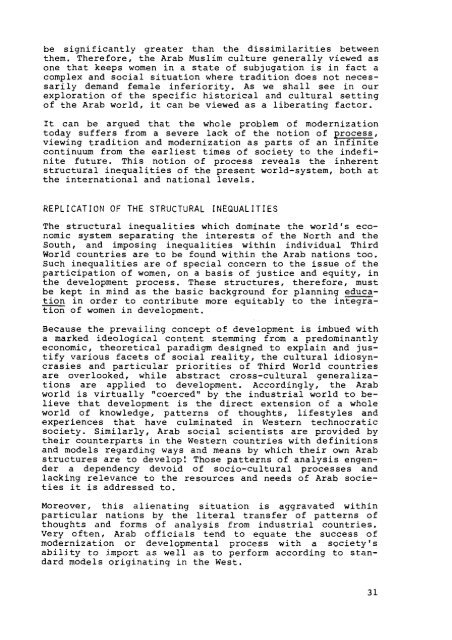Ifda dossier 47, May/June 1985
Ifda dossier 47, May/June 1985
Ifda dossier 47, May/June 1985
Create successful ePaper yourself
Turn your PDF publications into a flip-book with our unique Google optimized e-Paper software.
e significantly greater than the dissimilarities between<br />
them. Therefore, the Arab Muslim culture generally viewed as<br />
one that keeps women in a state of subjugation is in fact a<br />
complex and social situation where tradition does not neces-<br />
sarily demand female inferiority. As we shall see in our<br />
exploration of the specific historical and cultural setting<br />
of the Arab world, it can be viewed as a liberating factor.<br />
It can be argued that the whole problem of modernization<br />
today suffers from a severe lack of the notion of process,<br />
viewing tradition and modernization as parts of an infinite<br />
continuum from the earliest times of society to the indefi-<br />
nite future. This notion of process reveals the inherent<br />
structural inequalities of the present world-system, both at<br />
the international and national levels.<br />
REPLICATION OF THE STRUCTURAL INEQUALITIES<br />
The structural inequalities which dominate the world's eco-<br />
nomic system separating the interests of the North and the<br />
South, and imposing inequalities within individual Third<br />
World countries are to be found within the Arab nations too.<br />
Such inequalities are of special concern to the issue of the<br />
participation of women, on a basis of justice and equity, in<br />
the development process. These structures, therefore, must<br />
be kept in mind as the basic background for planning educa-<br />
tion in order to contribute more equitably to the integra-<br />
tion of women in development.<br />
Because the prevailing concept of development is imbued with<br />
a marked ideological content stemming from a predominantly<br />
economic, theoretical paradigm designed to explain and jus-<br />
tify various facets of social reality, the cultural idiosyn-<br />
crasies and particular priorities of Third World countries<br />
are overlooked, while abstract cross-cultural generaliza-<br />
tions are applied to development. Accordingly, the Arab<br />
world is virtually "coerced" by the industrial world to be-<br />
lieve that development is the direct extension of a whole<br />
world of knowledge, patterns of thoughts, lifestyles and<br />
experiences that have culminated in Western technocratic<br />
society. Similarly, Arab social scientists are provided by<br />
their counterparts in the Western countries with definitions<br />
and models regarding ways and means by which their own Arab<br />
structures are to develop! Those patterns of analysis engen-<br />
der a dependency devoid of socio-cultural processes and<br />
lacking relevance to the resources and needs of Arab socie-<br />
ties it is addressed to.<br />
Moreover, this alienating situation is aggravated within<br />
particular nations by the literal transfer of patterns of<br />
thoughts and forms of analysis from industrial countries.<br />
Very often, Arab officials tend to equate the success of<br />
modernization or developmental process with a society's<br />
ability to import as well as to perform according to stan-<br />
dard models originating in the West.
















